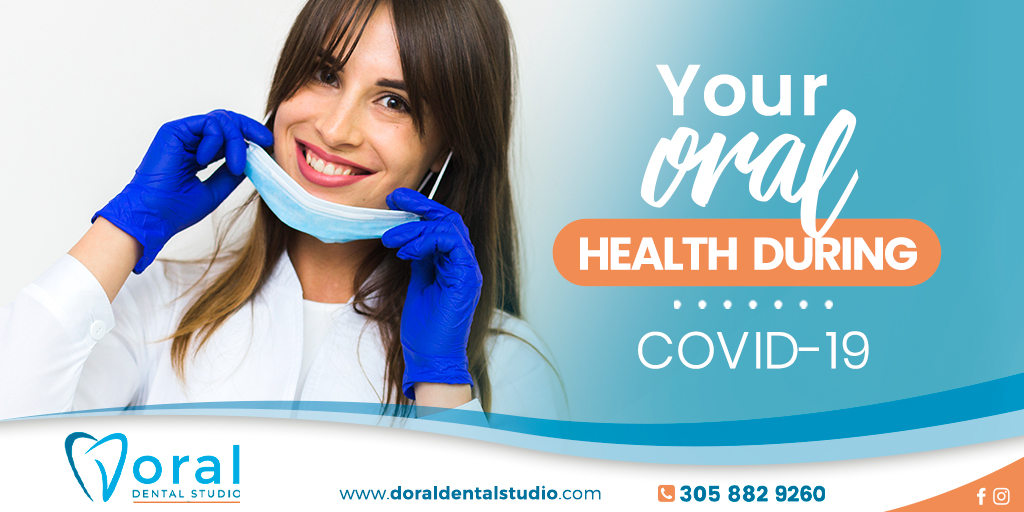All of us are going through a lot of change right now. The novel coronavirus (COVID-19) has disrupted our lives in many ways. While there are a lot of things we can’t do, we can still take care of our health.
With dental offices across the country postponing non-emergency dental treatment, it’s more important than ever to keep up with your dental homecare. We’re here to help with tips and answers.
How should I keep my teeth healthy during COVID-19?
With a lot of us working from home and adjusting to new routines, it’s easy to put aside our dental health. Here are a few tips to help:
- Wash your hands – aim for at least 20 seconds before and after any personal dental care
- Brush at least twice a day– be sure to get those hard-to-reach spots
- Floss once a day – this helps remove bacteria and plaque in places your brush can’t reach
- Eat a well-balanced diet – limit sticky, sugary snacks like cake and cookies
- Limit frequency of snacking – frequent snacking increases your risk of cavities
- Limit sugary drinks – soda and fruit juices can harm tooth surfaces
- Drink plenty of water – drink water with meals and between meals
- Avoid smoking – smoking limits blood flow to your mouth, making it easier for bacteria to grow
What should I do in a dental emergency?
For your safety and the safety of health care providers, please do not visit an urgent care clinic or an emergency room for your dental care needs. Please contact your dentist for guidance.
Your dentist can handle many situations over the phone, such as helping with a toothache or a filling or crown that has become loose. If you’re unsure about your situation, your dentist will be able to help. The American Dental Association has also created several resources for patients and dentists to follow.
Dental clinics may be postponing non-emergency procedures, but your dentist can still make appropriate arrangements if you need care.
In general, something qualifies as a dental emergency if it puts a person in a high-risk condition. For example, uncontrolled bleeding or a bacterial infection that causes swelling and interferes with breathing.
Are there some general guidelines to follow for dental issues that arise?
You can temporarily solve certain dental problems with items from your medicine cabinet or pharmacy.
- Dental pain – For dental pain, the key is whether there is swelling and if the pain continues. As with all medicines, please be sure to follow instructions.
For pain without swelling – common over-the-counter (OTC) pain medicines can help. You can take a combination of Ibuprofen and Acetaminophen. Contact your dentist for appropriate dosage and if the pain continues.
For pain with swelling – in addition to OTC pain medicines, rinse your mouth with warm saltwater for short-term relief. Consult your dentist for further guidance.
- Fractured tooth, lost filling, lost crown or bridge – You can get OTC temporary filling material from the dental aisle of your pharmacy. Many of these products are also available online and can be delivered to your home. Ask or search for “loose cap or filling repair.”
- Broken or ill-fitting dentures – Search your pharmacy for “denture repair kits” or “denture reline kits.”
- Trauma – If you experience a physical injury to your mouth, contact your dentist for guidance. Your dentist will evaluate your situation and recommend next steps.
- Gum, cheek, tongue and lip pain
For children experiencing pain in any of these soft tissue areas, OTC pain medicines like children’s Ibuprofen and Acetaminophen can help. There are also children’s oral gels that can offer relief. Contact your dentist or pediatric dentist for help.
For adults experiencing pain without swelling, common OTC medicated gels are available, including the brand name Orajel.
If you’re in doubt about your situation, reach out to your dentist for help.
What should I expect in the coming weeks and months?
The dental community is continuing to adjust to the rapidly changing situation with COVID-19. In the short term, we’re focused on providing emergency dental care and giving people resources to help protect their oral health. As the situation evolves, we’ll adjust to federal and state guidelines to ensure the safety of our patients, staff and community.
Visit us online if you need help with your dental care needs.

